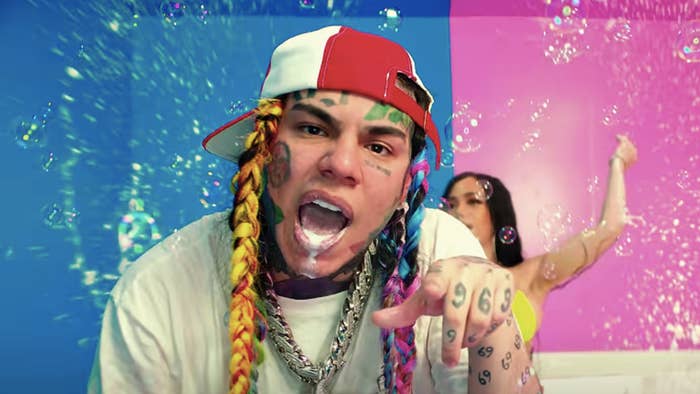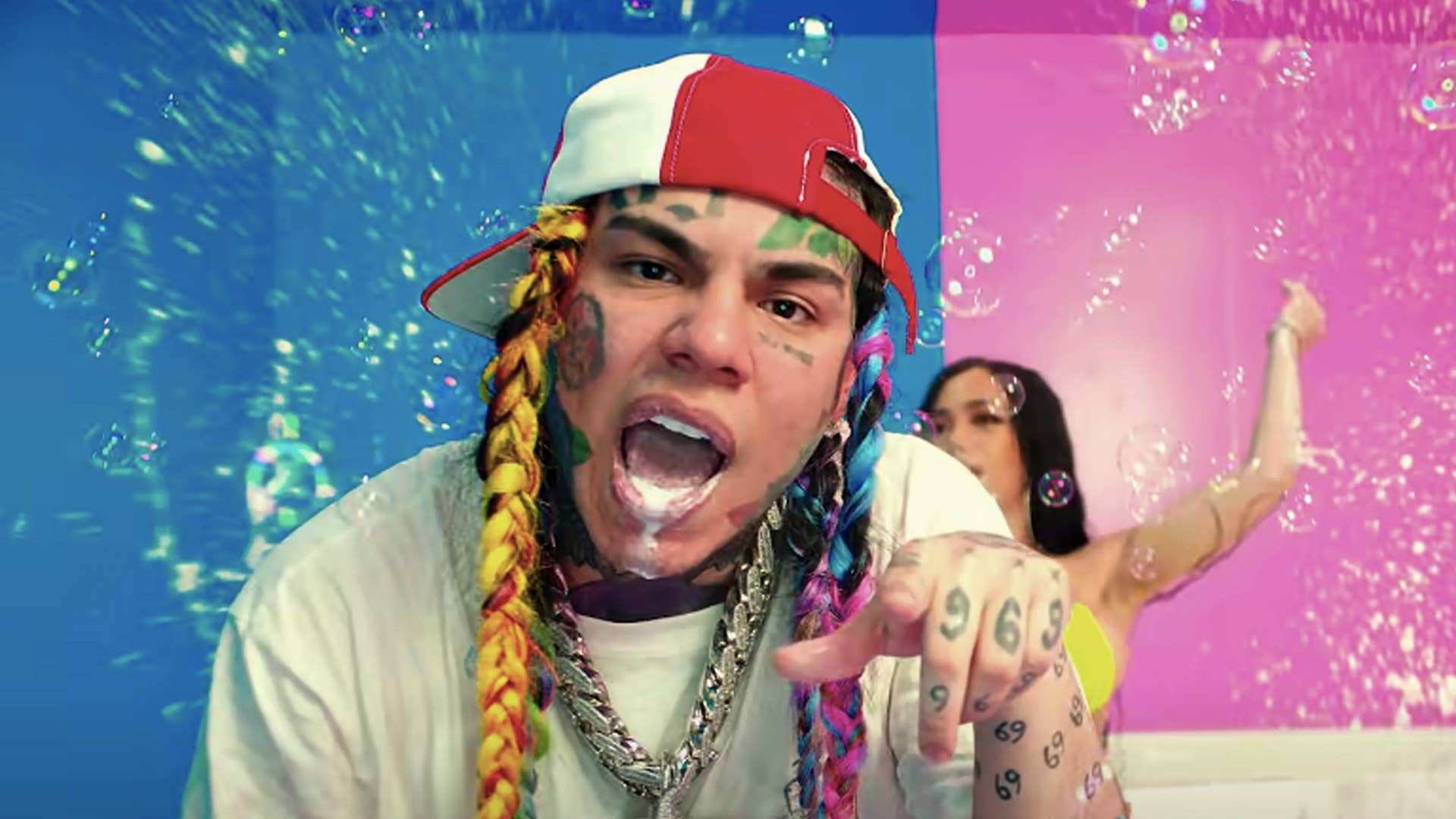
If you give a mouse a cookie, he's going to ask for a glass of milk. But if you take all the cookies away, he might actually leave you alone.
The same logic applies to an artist like Tekashi 6ix9ine.
Since the very beginning of his career, all of 6ix9ine's decisions have been made in service of one simple goal: to attract as much attention as possible. Before he even began rapping, he went viral for wearing a shirt that said "Pussy Eater" with the number "69" on it. And from there, he designed his entire aesthetic around catching people's eyes as they scrolled through Instagram feeds. Dying his hair and covering himself in over-the-top tattoos, he yelled, trolled, picked fights, recorded aggressive music, and made intentionally controversial statements.
6ix9ine fully leaned into the idea that in today’s era, any attention is good attention. A hate-click is still a click. He knew that getting someone to stream his song out of pure curiosity would put just as much money in his pocket as a stream from an avid fan who actually enjoys the music.
For a while, it worked. By mid-2018, 6ix9ine was arguably the hottest rapper on the planet. Dominating the hip-hop news cycle, he monetized his social media attention through music, and every song he released shot up the Billboard charts. For a moment, it seemed his arrest and cooperation in a federal racketeering case would force him to reevaluate his methods, but when he returned from prison in 2020, he actually capitalized on more attention than he’d ever received.
As he gloated in his much-hyped return to Instagram Live in early May, "If a rat came home and did more numbers than me, I would be mad, too." Attracting over 2 million simultaneous viewers, the stream broke a record for the most-watched IG Live in history at the time. And he made the most of the platform, telling everyone to go stream his comeback music video for "GOOBA," which shattered an all-time YouTube record for the biggest hip-hop video debut, with a staggering 43.55 million views in a 24-hour period. A month later, his follow-up single with Nicki Minaj, "TROLLZ," debuted at the top of the Billboard Hot 100, becoming the first No. 1 single of his career.
Emboldened by the unprecedented numbers, 6ix9ine settled right back to his old attention-seeking habits. Taunting critics, he loudly shouted "I can't be stopped" during a video that he uploaded to Instagram in celebration of his first No. 1 single. "You can't blackball me!" he repeatedly screamed into the camera. Then, in an effort to disprove perceived "haters" who assumed he would have gone into hiding after returning home from jail, he embarked on a bizarre public tour around the country. Freed from house arrest, he filmed a music video for "PUNANI" in the streets of his old stomping grounds in Brooklyn, defiantly running through neighborhoods that people assumed he’d never be able to enter again. Then he flew to Chicago and baited Lil Durk by disrespecting the death of his cousin, before heading to L.A. and trolling rivals in front of a mural of Nipsey Hussle.
Leading up to the release of his first post-prison album, TattleTales, it was clear 6ix9ine felt vindicated by the numbers. For a moment, at least, it seemed he had beaten the odds yet again and his attract-attention-at-all-costs strategy had worked. Early projections hinted that first-week sales for TattleTales would hover around 150,000 units, which would have earned him his first No. 1 album (his most successful debut yet). It appeared as though he had avoided any real repercussions from the racketeering trial, and we would all just need to get used to seeing his face online every day again.
To keep operating as he was, 6ix9ine desperately needed revenue from streams. And to get streams, he needed attention. Getting flat-out ignored was his biggest fear.
Then, everything changed. The actual first-week sales for TattleTales were dramatically lower than projections. In reality, it only moved 53,000 units in its first week, debuting at No. 4 on the Billboard 200 albums chart. After the initial shock of seeing him return on Instagram Live and dropping comeback singles, it seemed people were growing tired of the spectacle. For an artist who constantly obsesses over his own numbers, this was a crushing blow. Learning that far fewer people had streamed his album than he anticipated, 6ix9ine quickly transitioned to damage control mode.
At first, he tried to laugh along with it, making tongue-in-cheek videos of himself desperately passing out copies of his CD to people in the street and tearing down his own promotional posters. But the lack of attention deprived 6ix9ine of his most important fuel. Since becoming a federal informant, he hasn’t been able to rely on the shock value of his gang ties, so his whole shtick shifted to constant reminders about “the numbers” and how his music was performing better than people assumed it would. When those numbers declined, he wasn’t left with anything to say.
Most importantly, though, the disappointing commercial performance of TattleTales hit 6ix9ine in his wallet. After all, funding his post-prison antics required a lot of money: he admitted to paying six figures a month on a 24/7 security team to keep him safe during his public stunts. And his label, which reportedly signed him to a deal worth over $10 million, was hoping for much higher sales numbers than what he achieved. Fifty-three thousand first-week units is a concerning number for an artist trying to recoup on a deal that big.
To keep operating as he was, 6ix9ine desperately needed revenue from streams. And to get streams, he needed attention, whether it was positive or negative. Getting flat-out ignored was his biggest fear. So, when the album didn’t perform as well as he hoped it would, he went away.
Since 6ix9ine uploaded a video of himself defacing his own posters on September 11, he hasn’t shared anything on Instagram or any other social media app. Outside of his time in prison, this has been his longest break from social media since fame. He also stopped flying all over the country and trolling his rivals. For once, 6ix9ine is quiet, a turn of events that likely never would have happened if TattleTales were a massive commercial success like he hoped. If he debuted at No. 1, we might still be hearing him yell about how he "can't be stopped" on Instagram Live.
Of course, it's unlikely that he'll be gone forever. Although he hasn't yet returned to social media, there have already been 6ix9ine sightings. On October 13, a week after reports surfaced that he suffered effects from taking too many caffeine and weight loss pills, a fan shared a video of a run-in with a relatively subdued 6ix9ine, his first appearance on camera since September. His signature rainbow hair was gone, and he calmly addressed the camera as he shouted out a fan. For a moment, at least, he appeared humbled.
Regardless of how the 6ix9ine story ends, the past month has been a reminder of the power of the consumer in 2020. In the attention economy of social media, every click leads to revenue, and online habits lead directly to real-world consequences. Hate-listening to a new song from a controversial artist out of sheer curiosity still puts money in their pocket, enabling them to keep doing what they've been doing. Refusing to buy an album or merchandise isn’t enough anymore. Even though you’re not spending money on it, clicking on a shocking YouTube music video still acts as monetary support and positive reinforcement. Streaming DAYSTAR on Spotify is still a form of financial endorsement, even if you publicly canceled Tory Lanez on Twitter.
An artist like 6ix9ine can't keep functioning the way he has without the revenue that each of your streams provides him. So if you want someone like him to go away, or inspire him to completely rethink his approach altogether, the most powerful thing you can do is to simply stop clicking on his music.
Since 6ix9ine emerged, people have been guessing when he'd disappear. Turns out he'd go away when we finally stopped giving him the cookies he so desperately craves.

